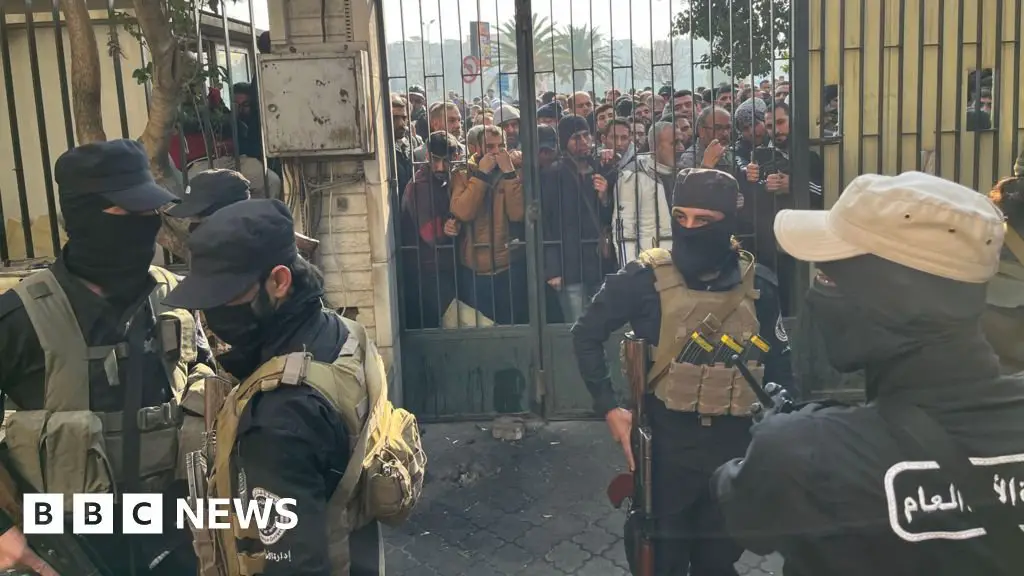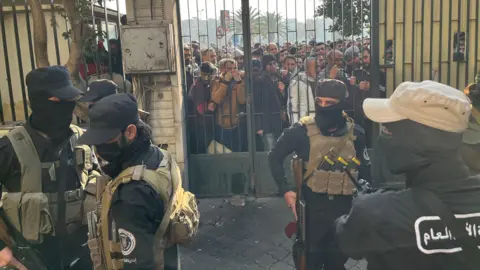 Aamir Peerzada/BBC
Aamir Peerzada/BBCOn the night of December 6, Mohammed el-Nadaf, a soldier in the Syrian army, was at his position in Homs.
As rebels led by Hayat Tahrir al-Sham (HTS) advanced into the city, days after seizing control of Aleppo and Hama in a lightning offensive, Mohammed decided he did not want to fight.
“We had no orders, no information. I took off my uniform, left my weapons behind and set off for my village in Tartus,” he said.
At about the same time, Mohammed Ramadan was in a position on the outskirts of the capital, Damascus.
“There was no one to give us orders. Many of our commanders fled from us. So I thought, why should I die and fight for someone who didn’t even give me enough salary to support my family?”
“For our daily rations as soldiers we only got one egg and one potato.”
The next morning he also left his position and went home.
The soldiers’ statements shed light on the rapid collapse of the regime of deposed President Bashar al-Assad.
To many of his demoralized and poorly paid troops on the ground, the speed with which their defenses collapsed in the face of the rebel offensive was no surprise.
Many soldiers told us that they earned less than $35 (£28) a month and that they had to work other jobs to make ends meet in a country where this covered only a fraction of basic living costs.
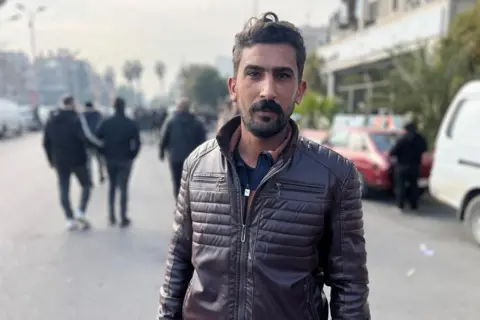 Aamir Peerzada/BBC
Aamir Peerzada/BBCMohammed Ramadan was holding the Kalashnikov rifle that had been previously assigned to him when we met him and several others at an HTS-run “reconciliation center” more than two weeks after the fall of the regime in Damascus.
At the center, former military, police and intelligence officers, as well as anyone who was a member of pro-Assad militia groups, can register for a temporary civilian ID and deposit their weapons.
HTS has announced a general amnesty for those who worked for the former regime.
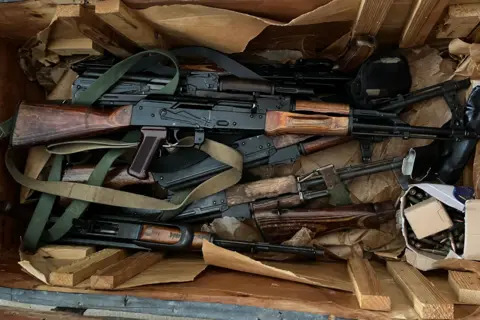 Aamir Peerzada/BBC
Aamir Peerzada/BBCWaleed Abdrabuh, a member of the group that oversees the reconciliation centers in Damascus, said: “The aim is for the weapons issued by the former regime to be returned to the state. And that members of the armed forces receive a civilian ID so that they can be reintegrated into society.”
Under Assad, conscription was mandatory for adult men. Conscripts had to give up their civilian IDs and were given military IDs instead.
Without a civil ID, it would be difficult to find a job or move freely around the country, which partly explains why tens of thousands have turned up at centers in various cities.
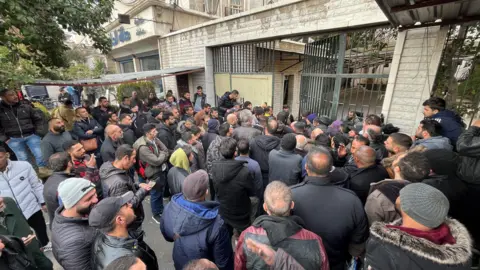 Aamir Peerzada/BBC
Aamir Peerzada/BBCAt the center in Damascus, formerly an office of Assad’s Ba’ath Party, hundreds of men pushed toward the gate and demanded entry.
Many of them wanted to distance themselves from the regime’s crimes.
“I did not take part in any of their bad deeds. I consider them despicable acts. I did everything not to be involved in massacres and crimes against Syrians,” said Mohammed al-Nadaf.
“I even tried to leave the military twice because I knew I was on the wrong side. But it was not possible to escape. The military had all my civilian documents.”
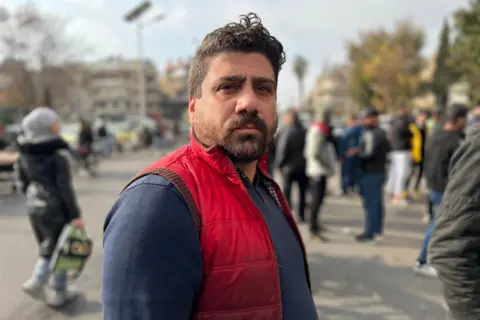 Aamir Peerzada/BBC
Aamir Peerzada/BBCSomar al-Hamwi, who served in the military for 24 years, said: “Most people don’t know anything, okay? As for me, I don’t know what happened in Saydnaya or any of the prisons.”
The BBC cannot independently verify their claims.
Anger at the regime and Assad’s decision to flee to Russia on December 7 as the rebels approached Damascus was also palpable.
“He (Bashar al-Assad) took a lot of money and ran away. He left all these people, all of us military men, to our own fate,” Somar said.
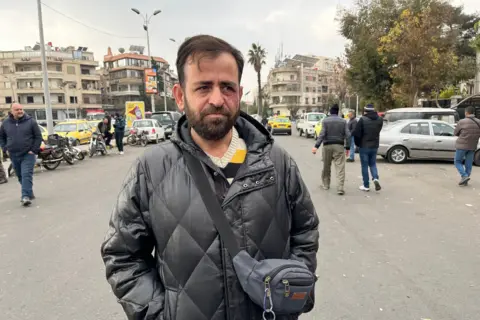 Aamir Peerzada/BBC
Aamir Peerzada/BBCThere were many worried faces among the crowds at the reconciliation center, but the atmosphere seemed relatively friendly despite the 13-year civil war that has left more than half a million people dead.
“Everyone told me it was safe and that I should reach an agreement at the center. HTS’ security guarantee has made a big difference,” said Mohammed al-Nadaf.
But there are increasing reports of suspected revenge attacks involving killings, kidnappings and arson from various parts of Syria. There are no reliable statistics confirming how many attacks have taken place, but dozens have been reported on social media.
Last week, three judges who ruled on property matters in the previously regime-controlled town of Masyaf in northwestern Syria were killed – Mounzer Hassan, Mohammed Mahmoud and Youssef Ghanoum. Sources at the hospital where their bodies were examined told the BBC they had been hit in the head by a sharp object.
We went to the village of Alamerea to visit Mounzer Hassan’s house. It was bare, cold and looked like it needed repairs.
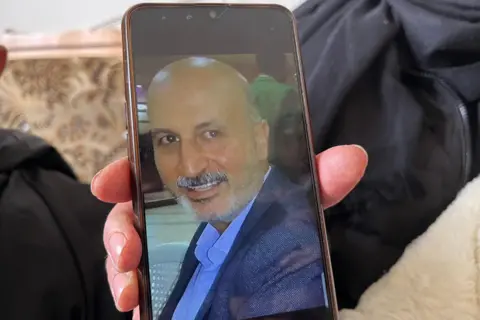 Aamir Peerzada/BBC
Aamir Peerzada/BBCMounzer’s wife, Nadine Abdullah, told us she believes her husband was targeted because he is an Alawite – the minority sect from which the Assad family comes and which included many members of the former regime’s political and military elite.
“Since they were civil judges and not criminal judges, I believe they were killed simply because they were Alawites. Not all Alawites benefited from Bashar al-Assad. Those who worked for the regime were forced to follow orders, otherwise brutal measures would have been imposed on them,” Nadine said.
Mounzer’s brother Nazir said: “This is a crime against an innocent person. It is unacceptable. Those killed had no connection to the regime’s politics. They only worked to support their poor families.”
Mounzer was the father of four young children and the only wage earner in his family, who also cared for his ailing father and brother.
His family said they raised their voices because they wanted such deaths to be prevented in the future.
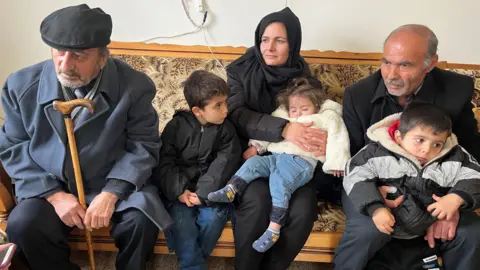 Aamir Peerzada/BBC
Aamir Peerzada/BBC“Everyone says HTS did not commit the crime. But as a government agency, they now have to find out who did it. “You have to ensure protection for all of us,” said Nadine.
The interim government of HTS condemned the murder of the judges and announced that it would find the perpetrators. It also denied involvement in reprisal killings.
Protests erupted in Masyaf following the judges’ killing, and many Alawites have told the BBC they are now concerned for their safety.
While HTS has announced an amnesty for Assad’s forces, they have also said that those involved in torture and killing will be held accountable. It will be difficult to find a balance.
A few weeks after the fall of the regime, it is a delicate moment for Syria.
Additional reporting by Aamir Peerzada and Sanjay Ganguly.


